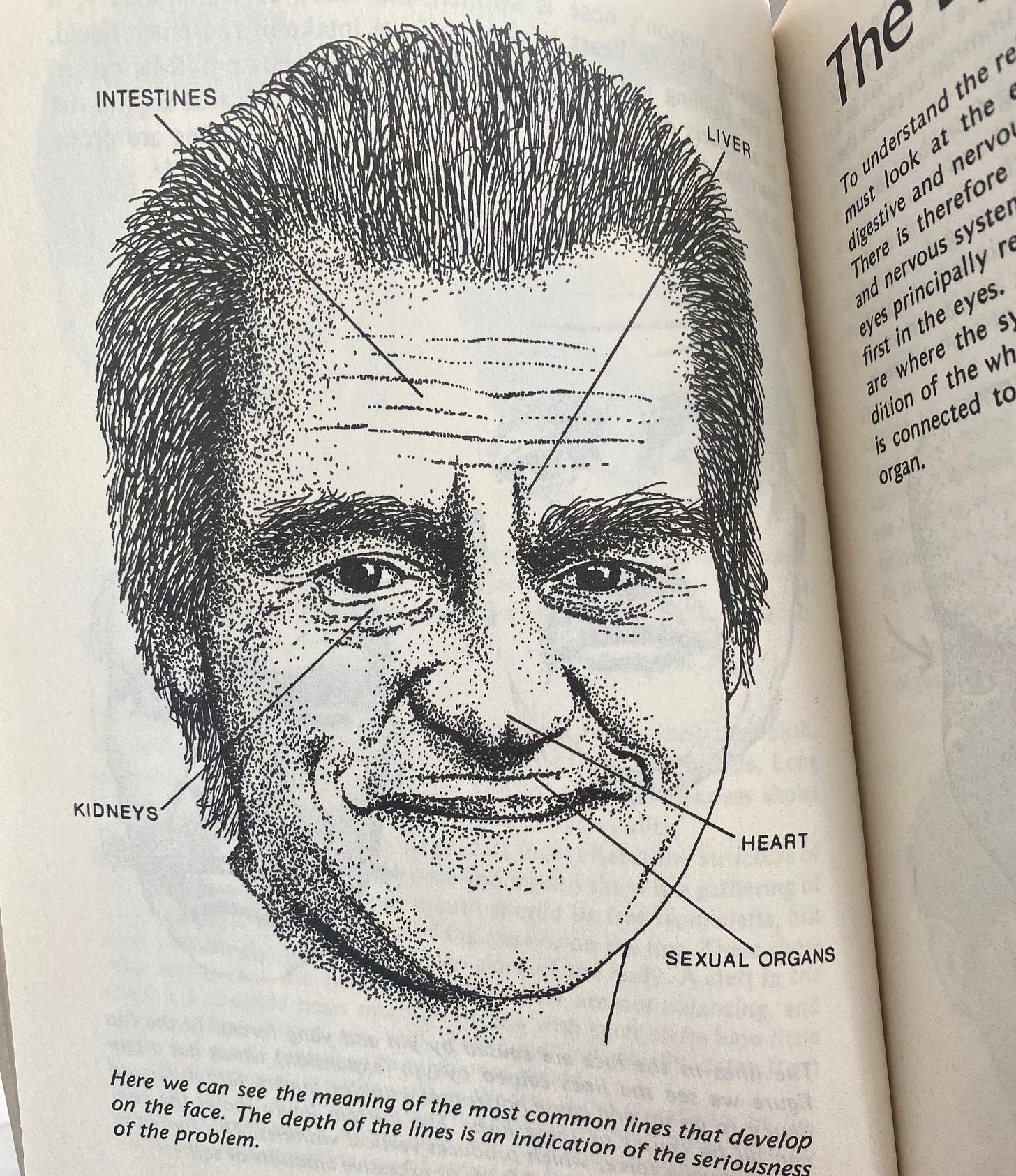You can tell a lot about a person’s health by their physical appearance. Have you ever seen someone and thought, wow, they’re radiating health? Or, yikes, they look unwell? Usually, you’re noticing things like the whites of their eyes, under eye bags, glowing skin, and their fitness. Thanks to evolution, we’ve been conditioned to pick up on indicators of good or bad health. There are other physical features that are telling of health, though, that don’t get talked about as much.
Michio Kushi, a pioneer of the macrobiotic diet, natural foods, and original founder of Erewhon Market, outlines these in his pointedly titled books, Your Face Never Lies and Your Body Never Lies. Stemming from several-thousand-year-old Chinese, Japanese, Indian, and Korean tradition, what Kushi dubs “Oriental Diagnosis” could give us a peek into the general health of our organs and bodily systems. Things like yellow skin from jaundice (related to the liver, gallbladder, and pancreas), eyebrow thinning linked to the thyroid, and acne on the chin/jawline indicative of hormone imbalance are all examples of how we use clues externally to understand what’s happening internally. Kushi says “...each individual represents a walking history of his or her development. The strengths and weaknesses of our parents, the environment we were brought up in, and the food we have eaten are all expressed in our present condition.”
One of my favorite parts of health coaching is seeing firsthand how a person’s physical features change as they transform their diet and lifestyle. I’ve noticed it in myself and my clients.
Here are some insights from Kushi’s books:
Horizontal forehead lines — Barring older age (obviously), wrinkles on the forehead can be a huge indication of poor intestinal health. I’d be lying if I said this isn’t the first thing I look at whenever I meet someone. Reducing the depth of these wrinkles or eliminating them altogether is one of the most obvious changes I see when I coach clients. Personally, I developed forehead wrinkles by the time I was 16! It clearly wasn’t due to age, so I thought it was genetic since my mom had them. What I didn’t think about, at the time, was that I was also constipated for most of my childhood. Once I fixed my digestion, they disappeared. Yes, my skin looks younger now at 26 than it did at 16.
Vertical lines above the nose, between the eyebrows — Another common and obvious one. Vertical wrinkles between the eyes can be a result of an overburdened liver due to too much protein and fat in the diet. I see this a lot with heavy meat eaters.
Bags under the eyes — Kushi says that the area around the eyes is related to the kidneys. Bags and wrinkles can be attributed to water retention or a diet too high in fat.
Dark circles around the eyes — Dark circles around the eyes might indicate overtaxed kidneys and exhausted adrenal and gonadal hormones.
Skin redness — General redness of the skin can be attributed to poor heart and circulatory health, due to a diet high in animal products.
A line above lips when smiling — For women, a horizontal wrinkle above the lips when smiling can indicate trouble with menstruation and for men, weak sexual vitality. This is something I noticed in myself when I had painful and debilitating periods!
Half moons on nails — Half moons on the bottom of your nails are a sign of good metabolism and circulation. They can disappear and reappear according to your diet and lifestyle, but they’re largely dictated by genetics to begin with.
Pimples/eczema — Skin conditions like pimples and eczema can be related to the excretory and digestive systems. Reducing fatty foods, sugar, and flour products may be able to help clear them up.
Increasing head size — This isn’t in Kushi’s books, but it’s definitely worth mentioning. Your head should stay the same size or get smaller as you age. Yet, a lot of us see our heads getting bigger. Here’s a great post showing side by side comparisons of actors and their heads getting bigger over time. Personally, I noticed this in myself, and I see it in my friends especially now compared to when we were in college five years ago. When I changed my diet and lifestyle, my head actually got smaller.
It’s fun to notice and watch our features change, but we shouldn’t be paranoid or obsess over them. I hope this post gave you some insight on how our bodies are communicating with us all the time!
Be well,
Zeina
Disclaimer: This information is not intended or implied to be a substitute for professional medical advice, diagnosis, or treatment. Talk to your doctor or a healthcare professional before any dietary or lifestyle changes.

